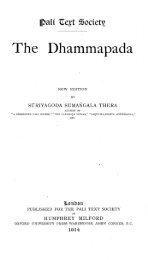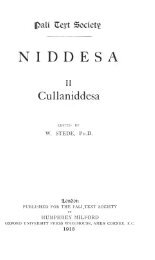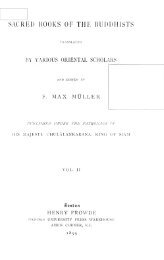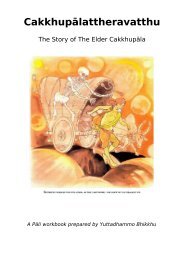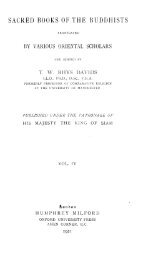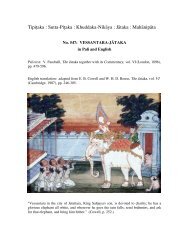Lessons In Practical Buddhism - Sirimangalo.Org
Lessons In Practical Buddhism - Sirimangalo.Org
Lessons In Practical Buddhism - Sirimangalo.Org
You also want an ePaper? Increase the reach of your titles
YUMPU automatically turns print PDFs into web optimized ePapers that Google loves.
<strong>Practical</strong> Dependent Origination<br />
<strong>In</strong>troduction<br />
An important quality of the teaching of the Buddha is that it<br />
is true to the nature of how things arise and how they cease;<br />
it teaches that everything that arises comes from a cause.<br />
The teachings of the Buddha are able to describe the actual<br />
causes that give rise to our present state of affairs, as well as<br />
the effects that come from how we respond and interact with<br />
the world around us in this present state.<br />
The Buddha taught for the purpose of cultivating an<br />
understanding of cause and effect on a practical level – as to<br />
the causes of our present state, what consequences will<br />
come from our present actions, and what actions are likely to<br />
come from our present state of mind. This is the Buddha’s<br />
teaching on dependent origination (paticca-sammupada),<br />
which says that all of our happiness and suffering – all of the<br />
difficulties and upsets, stress and dissatisfaction that we<br />
meet with in the world as well as all of the peace, happiness,<br />
and well-being – has a cause. The teaching of the<br />
paticca-sammupada is able to describe this cause. The<br />
teaching of dependent origination is the perfect method for<br />
us to understand and overcome the causes of suffering and<br />
thereby become free from all of suffering and stress that<br />
might come in the future.<br />
The Buddha’s teaching on dependent origination is best seen<br />
as a practical teaching. Often when people approach the<br />
teachings of the Buddha they will consider it from an<br />
intellectual point of view, trying to understand it logically, to<br />
think of examples by which they can understand and accept<br />
the teachings. Often this results in adapting the teaching in<br />
order to assimilate it into their own view and understanding<br />
of reality. This is not the most proper or beneficial approach<br />
to the Buddha’s teaching, especially his teaching on cause<br />
and effect, because it is something that can be seen and<br />
understood in our experience of reality through the practice<br />
of meditation.<br />
108



